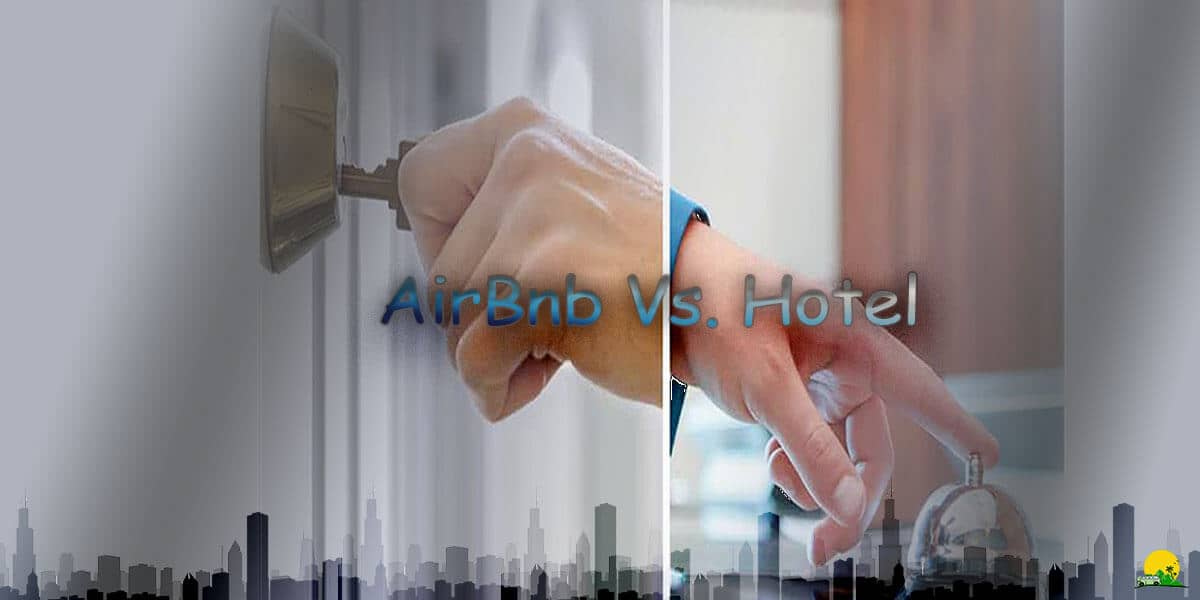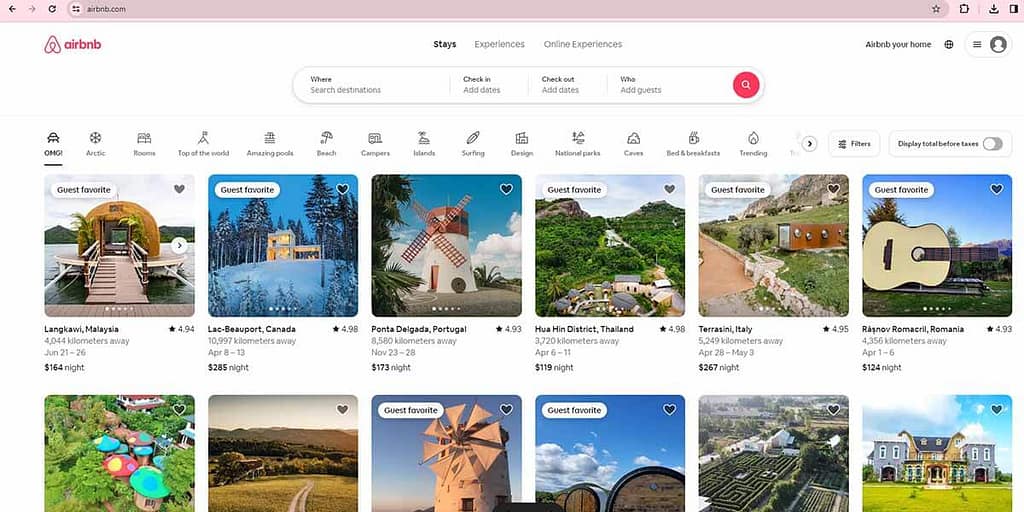
Comparing Airbnb vs Hotels – Which is Best?
When planning accommodations for your next trip, you will likely decide between booking an Airbnb rental or reserving a hotel room. Both options offer pros and cons depending on your travel needs, budget, and preferences. In this article, we will provide an in-depth comparison of Airbnb and hotels across various factors to help you determine which lodging is best for your situation.
index
ToggleAirbnb Overview

Founded in 2008, Airbnb is a global online marketplace connecting people who want to rent their homes or spare rooms with travellers seeking accommodation in a new city or town.
With over 7 million listings in 100,000 cities globally, Air bnb has disrupted the hospitality industry by offering an alternative to traditional hotels. Its diverse inventory, focus on experiences, and community aspects have made it popular with travellers of all types.
Hotel Industry Overview
The hotel industry encompasses various accommodation types, including luxury resorts, budget motels, boutique inns, and large chains.
With over 5.3 million rooms globally, hotels provide a consistent, standardized hospitality experience. However, their generic offerings and higher prices have made them more commoditized than unique Airbnb rentals.
Price – Air bnb Often Cheaper, Especially for Groups
Regarding price, Airbnb usually has a clear advantage – especially for multi-night stays or groups travelling together. Here’s a breakdown:
Nightly Rates: In most cities, the average Airbnb nightly rate is significantly less than that of a comparable hotel, often by 30-50%.
Weekly/Monthly Discounts: Many Airbnb hosts offer discounts for weekly or monthly bookings, allowing even more significant savings for extended stays.
Additional Guest Fees: While both may charge for extra people, Air bnb fees are usually lower than the high hotel rates of $15-30/person.
No Resort Fees: Unlike hotels that tack on daily resort, facility or tourism fees, Airbnb rates are all-inclusive.
Kitchen Access: The ability to cook some meals when renting an entire home or apartment further reduces costs versus eating out.
Taxes: Airbnb may have lower taxes included compared to the high hotel occupancy taxes in some areas.
However, very last-minute Air bnb bookings within a week of arrival can be more expensive than hotels. High-end luxury properties on Airbnb may match or exceed 5-star hotel rates. However, price is a significant reason cost-conscious travellers choose Air bnb.
Privacy – Airbnb Wins for More Seclusion
Regarding privacy during your stay, Airbnb accommodations usually provide a significant advantage over hotels. Here are some key differences:
Entire Home Rentals: Having an entire apartment, house, or similar space to yourself with no shared walls/ceilings means ultimate privacy.
Interactions with Host: Hosts are usually off-site property managers or nearby for check-in, so you have complete independence.
No Neighbors: Hotel rooms involve thin walls and noise transmission issues. Multi-unit Air bnb still offers more seclusion than adjacent hotel rooms.
Living Space: Beyond just the bedroom, you have the freedom of a residential property’s entire living room, kitchen and other private areas.
Security: While both have locks, an entire home provides more of a sense of security versus a standard hotel door.
Of course, privacy levels may vary more for Airbnb private or shared rooms that involve interaction with hosts or other guests on site. However, an Air bnb rental is usually the best option for travellers seeking seclusion.
Read More: Role of Travel Agents in Booking Your Dream Vacation
Safety – Hotels Have Consistent Standards and Oversight
When it comes to safety considerations, hotels have some inherent advantages due to their large size and consistent standards:
Fire Safety: Hotels must meet strict building codes and conduct frequent evacuation drills/inspections that private homes may not match.
Emergency Response: On-site staff is trained to appropriately handle medical, criminal or disaster situations with quick external response times.
Security Systems: Hotels utilize CCTV, electronic critical systems, and controlled access points that individual Air bnb properties cannot replicate.
Vetting & ID Checks: While both require profiles and IDs, hotels may conduct deeper background/reference checks on all employees compared to individual hosts.
Oversight: Well-known brands maintain consistent global standards and undergo regular audits. Private rentals have more variability.
However, most Airbnb guests and hosts have safe, positive experiences. Airbnb conducts identity verification and reviews to help establish trust. Choosing highly-rated listings in safe areas mitigates risks. Ultimately, using common sense is most important regardless of where you stay.
Amenities – Hotels Offer More Consistent Services

When it comes to on-site amenities and services, hotels have the advantage of standardized operations:
Food & Beverage: Most hotels provide breakfast, with restaurants, bars and room service available 24/7. Airbnbs usually need more options.
Fitness Centers: Well-equipped hotel gyms let you work out on your schedule. Air bnb rentals rarely offer exercise facilities.
Business Centers: Concierges, printing, and private meeting rooms help travellers be as productive as at the office. Airbnbs focus more on leisure.
Pools & Spas: Luxury resorts and large hotels offer resort-style recreational amenities you won’t find at an Airbnb.
Regulations
While hotels face strict regulations, Airbnb regulatory frameworks are still evolving:
Zoning: Some cities restrict Air bnbs in residential zones due to nuisance concerns, only allowing them in commercial areas like hotels.
Licensing: To address safety and tax collection, many locales now require Airbnb hosts to obtain a short-term rental license similar to a hotel permit and registration number.
Cap Limits: To curb commercial operators, some cities place caps on the number of days per year that properties can be rented or the number of simultaneous guests.
Taxes: Most regions require Air bnb to collect and remit occupancy and tourism taxes from each booking, matching hotel regulations.
Party Houses: Many locations ban unauthorized events at Airbnb after high-profile issues to protect neighbourhood tranquillity.
As the model matures, balancing home-sharing opportunities with community concerns will determine its long-term acceptance and how regulations may tighten further. Compliance ensures smooth operations.
Read More: Hotel Safety Tips: Precautions to take when choosing and staying in hotels
So Which is Best – Airbnb or a Hotel?
After this comprehensive comparison, the best choice depends on your trip needs and preferences. Here are some general guidelines:
Budget Travelers: Airbnb’s lower nightly rates, kitchen access and longer-term discounts make it most cost-effective.
Families: Airbnbs with extra space, kitchens and separate bedrooms suit family trips better than small hotel rooms.
Groups: Splitting an Air bnb is cheaper than multiple hotel rooms and provides a shared common space.
Business Travel: Hotels are most convenient for short trips with consistent amenities, services and loyalty programs.
Luxury Travel: High-end hotels often surpass Airbnb for resort experiences with top-tier service and facilities.
Conventions: Hotels co-located with conference centres are most practical for work events.
Spontaneous Trips: Last-minute hotel availability may beat finding an Air bnb on short notice.
Overall, for unique experiences, extended vacations or trips with families/groups on a budget, Airbnb has a compelling value advantage. However, hotels provide more consistent comfort for short, business or luxury trips. Both have merits – it depends on your specific needs.
Recent Posts
Contact Us
+1 437 499 4559










